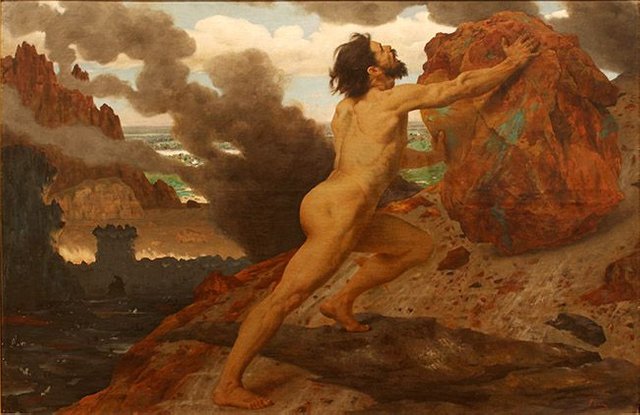Sisyphus without hope
"There is but one truly serious philosophical problem and that is suicide". With these words begins the essay by Albert Camus which is entitled The myth of Sisyphus.

Link
Sisyphus is a character in Greek mythology who was subjected to an eternal condemnation by the gods, which consisted of having to climb a heavy rock over and over again to the top of a mountain so that, inevitably, it would roll downhill again. Camus sees reflected in this myth the absurdity of the existence of the human being. With this conception of the human being, where his existence completely lacks sense, the question seems to come irremediably: is there an alternative to suicide?
Camus in his essay answers affirmatively, but without leaving aside for man this image of the condemned Sisyphus. His position would be summarized in saying that existence is an absurdity to be embraced. Camus gives us his arguments with undisputed depth and mastery, but perhaps not convincing. And maybe it's because, in defining the human being, he seems to have decided to put aside a concept that may be fundamental.
The hope
What is missing from Camus' work, what he never names, is hope. It is interesting to note that hope also has its counterpart in Greek mythology: when Zeus offers Prometheus (another who ended up suffering an eternal condemnation from the gods) in marriage to Pandora, he gives her as a dowry a box containing all the evils that of being open would suffer the humanity and, in addition, the hope (Elpis). Elpis is often called the last goddess, because it is her, to hope, to which human beings ultimately appeals when all evils appear to be about him.

Link
The Absurd Man that Camus describes lacks hope, he sees himself as condemned to repeat the same cycle over and over again. His world is circumscribed to what is today without giving rise to the possibility of change. There is no more dynamic than that of reiteration (which in Nietzsche would be the myth of the Eternal Return). His condemnation is the world to which man is "thrown".
In this way, it is not clear why the absurd man would choose to continue with his existence instead of opting for death. And here lies the fundamental difference between Sisyphus and modern man: Sisyphus has no choice, his condemnation is eternal insofar as it is defined on a supernatural plane, while the human being suffers his martyrdom in relation to his existence in the world . Sisyphus can not escape dying, man can.
The man susceptible of hope, on the other hand, is capable of looking for new ways, of yearning for something different. He interprets himself as an inhabitant of a world that can improve. Hope and absurdity both imply a discontent with the world in which they live, but they differ diametrically in relation to the attitude they take from that. The absurd man simply accepts his martyrdom, which he considers inevitable; the hopeful, on the other hand, transforms his discontent into an impulse to try to change. Its dynamism has the purpose of advancing, it is projected, and even when it can be condemned to reiteration it looks for modifications, but in addition that reiteration is allowed to conceive it as circumstantial. He manages to see beyond his rock and beyond his mountain. He is able to transcend his world even if it is not in thought. He believes it is possible to approach his longing, his illusion.